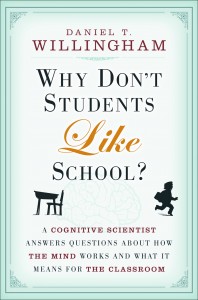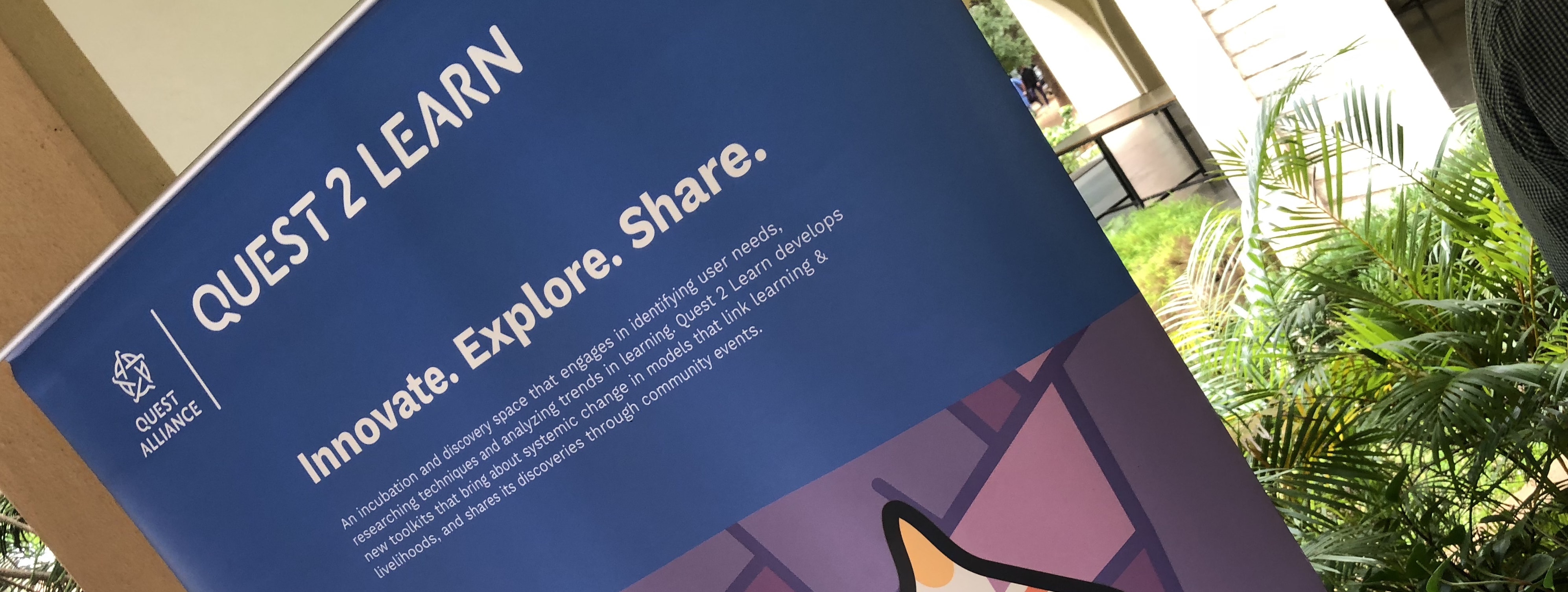
One of the challenges faced by all instructors is ensuring that students actually read the textbook. This summer we came up with a innovative assignment to address this issue. The book in question was Daniel Willingham’s Why Don’t Students Like School? A cognitive scientist answers questions about how the mind works and what it means for the classroom.
We called it the 3 x 3 x 3 project since their task was to create a video overview for each of the chapters in the book under the following guidelines: the video should be no more than 3 minutes long, it would provide 3 key ideas from the chapter and 3 practical implications of these ideas for educators and for teaching (hence 3 x 3 x 3!).
Beyond that we provided no constraints on the technology to be used, style to be followed. SInce we had 5 groups and the book has 9 chapters and a conclusion, each group got to create two of these short videos.
Here are the 10 videos the students created. In essence these 10 videos are a video summary of the book in 30 minutes! Enjoy.
Chapter 1: Why don’t students like school?
Chapter 2: How can I teach students the skills they need when standardized tests require only facts?
Chapter 3: Why do students remember everything that’s on television and forget everything I say?
Chapter 4: Why is it so hard for students to understand abstract ideas?
Chapter 5: Is drilling worth it?
Chapter 6: What is the secret to getting students to think like real scientists, mathematicians, and historians?
Chapter 7: How should I adjust my teaching for different types of learners?
Chapter 8: How can I help slow learners?
Chapter 9: What about my mind?
Chapter 10: Conclusion




In my opinion, some of the parents and kids are friendly at their home or where ever they are. alike teachers do the same action by getting respect will surely makes the students starts loving their teachers as well as their schools..
Are the student videos still available for viewing? I can’t seem to click on them. Thank you!
I had to move my web host when I moved to Arizona – and lots of links appear to have broken. Thanks for pointing it out. I have fixed it now. ~ punya
Are the student videos still available for viewing? I can’t seem to click on them.
I have used this wonderful text in a variety of ways in both undergraduate and graduate Ed Psych courses. It is very accessible and a great summary of much of the best research in the field.
This semester I assigned single chapters to small groups and had them do a half-hour Presentaion linking the chapter to material previously covered in class. One of the groups found this site and included the video from this site as a wrap up.
You have given me food for thought for future courses via this posting. Thanks.
I’m a big fan of this book and was very pleased to find this collection of videos. They’re all very effective at summarizing the concepts, and the conclusion video sums the book up very concisely. Well done, I’ll be sharing it with colleagues.
@Jedd, absolutely true. Creating the videos is far more pedagogically significant than watching them. That said, I do think that showcasing student work is always a good thing. AND, maybe someone somewhere may find it useful as an intro to the book. ~ punya
I am one of those people who have found this showcase of student work inspiring and helpful. I had read and loved Willingham’s book last summer but needed a refresher and this was perfect and engaging. Additionally, it was inspiring since I’m an instructional designer and love the idea of assigning students to make similar summary videos in other applications. When I go in to work today I plan to show my supervisor in hopes we can use this sort of assignment in some of our courses.
I really hoped I could see Chapter 3’s video but it appears it’s set to private! Would it be possible to make this video public?
Also, would you happen to have any sort of rubric you used for assessing student achievement in this assignment?
Thanks for doing this and publishing the results!
Thanks Adam. Since the videos are hosted on student’s own accounts I am not sure why Ch. 3 is private. I am trying to find out and hopefully will have a solution soon.
I think we had a somewhat holistic rubric since the videos were part of a broader set of summer courses and assignments. Essentially for the videos we looked at process (how the group went about reading, discussing, planning and implementing the videos), content (did they do a good job of representing the big ideas) and product (quality of video, audio etc.). One could, with minimal work, convert this into a rubric. Thanks ~ punya
Thank you Punya. Those criteria certainly work for me to develop into a rubric as needed. They’re similar to how we have assessed some group media projects we have.
I greatly appreciate your prompt response and accessibility. I suspect I may have many more questions for you in the future, about the TPACK framework, the Deep-Play Research group, and other interests we may have in common.
You are welcome. Keep in touch. ~ punya
Chapter 3 video is now online ~ punya
The value is in the creation of the video, right? Video can be a (relentless) linear narrative, and work against the processes required for metacognitive thinking and deep understanding. Increasing levels of activity encourage better learning so naturally producing these videos will have been far more effective pedagogically that learners passively watching it. Nice job.